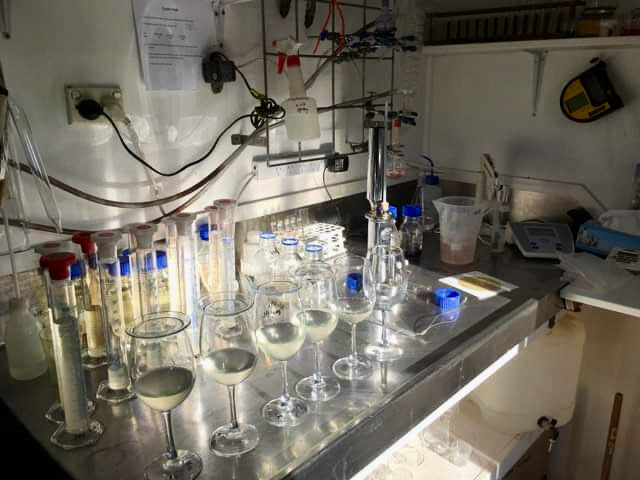
· By Trudy Sheild
Sulphites & Organics
As a winemaker I get asked lots of curly questions about wine! Two of the most common are, do your wines contain sulphites and are your wines organic?
Yes! There are sulphites in our wines! The term sulphite covers a large group of naturally occurring sulphur compounds, they will occur in even the most ‘natural’ of wines as it is produced by yeast during fermentation. But the sulphite people are usually referring to is sulphur dioxide (SO2) which has been used by winemakers since the 1800s. Winemakers use it to maintain the freshness of a wine, as it helps to minimise oxidation (as does careful production and storage of the product) which in turn will preserve the colour of the wine. It’s worth noting that sulphites are used as a preservative in many other food stuffs too (often at greater rates than in wine), like your salt n’ vinegar potato chips you like to woof down with that cold Sav!
During the winemaking process winemakers will analyse the levels of and make additions of SO2. When considering the amount of SO2 to use, a savvy winemaker (pun intended!) should consider primarily the pH of the wine as the higher the pH, the less effective the SO2 will be. Additionally, they should consider the alcohol level, other wine style features such as tannin and spritz (which all subtly contribute to preservation) travel plans and required longevity of the wine. They should ask themselves – ‘Is this intended to be consumed before the next vintage or is this wine going to be gracing shelves here and overseas for years to come’? By applying the above mentality, we can ensure not only that the freshness of our wine is maintained but that the total amount of SO2 (TSO2) used is kept to the bare minimum.
Secondly, no, our wines are not organic. Our growers and winery facility belong to Sustainable Winegrowing NZ™ which is widely recognised as a world-leading sustainability programme. It was established in 1995 and was one of the first in the international wine industry. The programme provides a framework that ensures we are continually working to improve all aspects of performance in terms of the environment, social and economic aspects of our wine-growing business. Yes, the use of chemicals is allowed under this regime, but they are limited to the best, and to a minimum, our growers adhering to a ‘Nil residue’ spray programme.
When the term organic is applied to wine-growing it means that no synthetic herbicides, pesticides, or fungicides are used to grow the grapes and that only organically certified products are used in the winery. Organic grape growers can still spray their vines with sulphur and copper, copper being one of the most controversial elements in organic farming of any type.
To be able to label your finished wine as sustainable or organic, production from the vineyard right through to the bottle will have adhered to a number of standards as set out by the different programmes. One of which is the total amount of sulphur (TSO2) allowed in the finished wine.
Sustainable:
White table wines must not exceed a TSO2 level of 200ppm or (mg/L).
Red table wines must not exceed TSO2 150 ppm.
Organic:
White table wines must not exceed TSO2 150ppm.
Red table wines must not exceed TSO2 100ppm.
I’m proud to report that with careful handling during production and careful consideration of the amount of sulphur we really, need to use to maintain the freshness of our wines we regularly keep our total sulphur levels under those outlined for organic wines. Below is an example of the total sulphurs of a few of our current wines that have already been bottled and analysed by Hill Laboratories for export certification:
- 2021 SHEiLD Pinot Noir TSO2: 39ppm
- 2021 SHEiLD Chardonnay TSO2: 73ppm
- 2022 SHEiLD Sauvignon Blanc TSO2: 120ppm
- 2022 SHEiLD Albarino TSO2: 90ppm
- 2022 SHEiLD Meunier Rose TSO2: 135ppm


